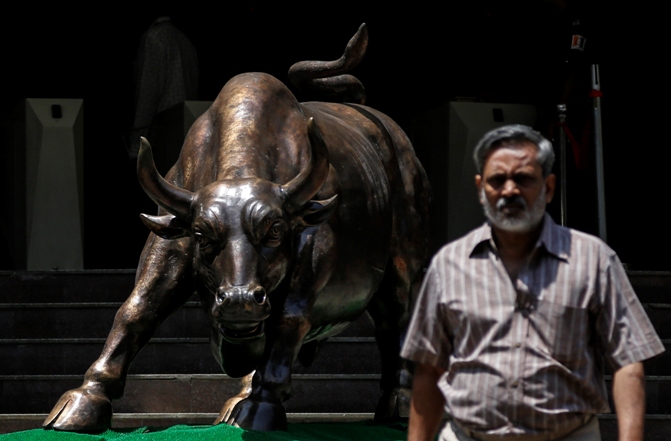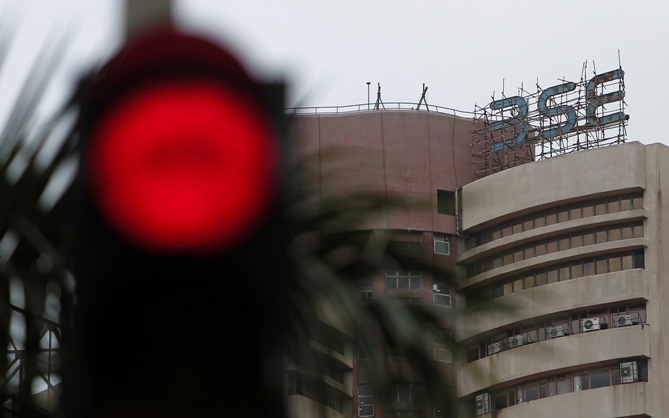Photographs: Reuters Sneha Padiyath in Mumbai
The bull run and revival in trading interest could see shares of hundreds of companies shed the ‘illiquid’ tag.
The ongoing rally, now more broad-based, has seen the market capitalisation of about 100 companies increase to above Rs 10 crore (Rs 100 million), an important threshold for identifying illiquid stocks.
A company is excluded from the so-called 'periodic call auction mechanism' if its market capitalisation is more than Rs 10 crore.
. . .
Modi effect bails out 100 penny stocks
Image: People look at a screen displaying the election results coverage on a screen inside the Bombay Stock Exchange building in Mumbai May 16, 2014.Photographs: Danish Siddiqui/Reuters
Introduced last year, the periodic call auction is a trading mechanism devised by the Securities and Exchange Board of India for illiquid stocks.
The system is put in place to curb price manipulation in penny stocks, though market players have expressed difficulties in trading under it.
Also, interest is seen dipping in stocks traded this way.
However, the current rally could ensure a lot of companies escape the call auction net and instead trade in the normal category.
Under call auction, trading is conducted on an hourly basis, wherein the first 45 minutes are for order entry and modification and the next 15 minutes for order matching and trading confirmation.
. . .
Modi effect bails out 100 penny stocks
Image: People look at a screen across the road displaying the election results on the facade of the Bombay Stock Exchange.Photographs: Danish Siddiqui/Reuters
This is in contrast to the normal market trading, where order-matching and execution take place on a real-time basis during market hours.
According to a Business Standard analysis, 107 companies have seen their market cap go up by two and four times so far in 2014.
Previously, they had valuations of less than Rs 10 crore (Rs 100 million) each and, hence, were vulnerable to being included in call auction trading or were already tagged as illiquid.
“After large-caps, the mid-cap and small-cap stocks have started rallying.
“These stocks could continue to rally as long as the market remains in bull territory,” said U R Bhat, managing director, Dalton Capital.
. . .
Modi effect bails out 100 penny stocks
Image: A bronze bull sculpture is seen as an employee walks out of the Bombay Stock Exchange.Photographs: Danish Siddiqui/Reuters
Market players said the current rally might pull a lot of stocks out of the illiquid counter to normal trading.
However, they advised caution, as it could also mean an increase in speculative activity. “Low liquidity often drives operators to these counters.
“As a result, the activity seen in these is due to speculation and not backed by fundamentals,” said Alex Mathew, head of research, Geojit BNP Paribas Financial Services.
“A lot of retail investors get attracted, as they look cheap on an absolute basis.
“However, that absolute price cannot be a metric for an investment decision.”
. . .
Modi effect bails out 100 penny stocks
Image: A man looks at a screen across the road displaying the Sensex on the facade of the Bombay Stock Exchange.Photographs: Danish Siddiqui/Reuters
Stock exchanges and Sebi have trading volume and financial performance-based criteria for identifying illiquid stocks.
By the new rules, if a company has an average daily trading turnover of less than Rs 200,000, it is moved to call auction trading.
However, if its market cap is more than Rs 10 crore or if it has paid a dividend or has been profitable in two of the past three years, and has less than 20 per cent promoter shares pledged, it can be excluded.
Small companies have begun to outperform large companies.
However, most of this is not backed by fundamentals, said analysts.
The benchmark indices -- BSE Sensex and NSE Nifty -- have gained about 16 per cent so far in 2014.
. . .
Modi effect bails out 100 penny stocks
Image: The Bombay Stock Exchange building is pictured next to a traffic signal in Mumbai.Photographs: Danish Siddiqui/Reuters
Meanwhile, the BSE mid-cap index has gained nearly 26.2 per cent, while the BSE small-cap index has risen 37.8 per cent during this period.
Evading Illiquid Tag
- In 2014, market cap of 107 stocks crosses Rs 10 crore, a criterion used to identify illiquid stocks
- These companies can now escape inclusion in the ‘periodic call auction’ mechanism
- The system was introduced last year to improve participation in select illiquid stocks
- Analysts concerned sharp movements in some of these stocks not backed by fundamentals
- Advise caution against high retail participation








article